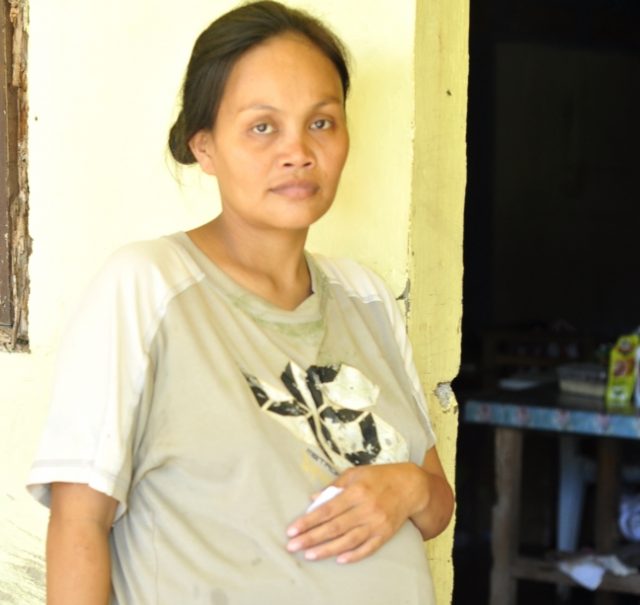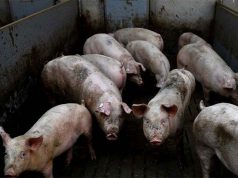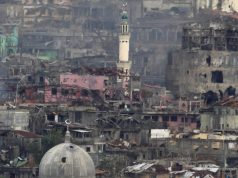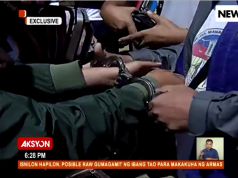ILIGAN CITY – Aslimah M. Dimaampao, 29 years of age and eight months in the family way, is expecting twins next month, July. She and her husband, Jamil, have five children and, being displaced from The Islamic City of Marawi wracked by ongoing armed conflict, she is bothered by an almost inexhaustible worry, this unfathomable uncertainty, as the days quickly tick by.
Since the time this family of bakwits [taken from the English evacuate, referring to internally displaced persons] fled from the siege in Marawi, they have been staying with relatives and neighbors in the Maahad Iligan Al-Islamie, a madrasah, or Arabic school, in Barangay Tubod, Iligan City.
It has been more than three weeks, but the inexplicable nightmare remains etched in her mind like a movie on perpetual replay.
She remembers the loud hissing, then booming, the ugly noise of the first bomb dropped in their village in Marinaut, Marawi City.
Their house was among those hit and destroyed after they had decided to transfer to a more secure dwelling.
Without a safe place to hide, they retreated to their neighbor’s basement.
When the bombs kept on dropping, they prayed and prayed that it be over soon.
Their children were crying and, though also scared, Aslimah and Jamil tried to assuage their fears.
For five days they waited for the chance to escape, which they thought wouldn’t come.
When they ascertained it was safe to emerge from hiding, they joined the throng of people from their village streaming towards the grounds of the provincial capitol, where they found temporary accommodation and were fed.
That must have been a time even an undistinguished pack of Sky Flakes would taste like the food of the Gods ever.
After a two-hour pause, they lost no time to continue the exodus, onward to Saguiaran five kilometers away.
Heavily with child and with the other siblings in tow, the trek was most difficult, to say the least, for Aslimah.
When they reached Saguiaran, they decided to rent a tricycle to take them to Iligan City.
There was to be no rest until they reached their relatives and neighbors in the madrasah.
Despite having made distance between them sure perdition in Marawi, the mental burden of processing what had just happened to the family would be fogged by their children showing signs of the stress and the trauma.
“Kaunting ingay lang, nanginginig na sila sa takot (They would shake with fear in reflex at the slightest perturbation or noise)”, Aslimah shares.
Even the whir of an electric fan seemed to hint passing of a helicopter, and the children would cringe. And it was all that Aslimah, their mother, could do for her children.
However, when a play session was facilitated by the psycho-social support team of Ranaw Disaster Response and Rehabilitation Assistance Center-MiHANDs among the displaced children, Aslimah was surprised to see her children smile and laugh as they drew, sang and played.
She felt relieved witnessing their tension ease even for a bit.
As for herself, Aslimah feared that her body might not be coping well with the stressful situation. Her muscles were often knotted in pain, and the heat sometimes made her breathing difficult. At times, her heart would palpitate for no apparent reason.
Her husband, Jamil, also suffered in pain and discomfort because of the cramped sleeping space that the family had to share with other bakwits.
The situation has become increasingly difficult to bear, especially as the count of the days toward her baby’s delivery are shortening.
They scarcely have funds to sustain their food requirements, let alone to prepare clothes, diapers, feeding bottles and other infant needs.
When an RDRRAC-MiHands volunteer gave her and her husband an infant kit complete with baby diapers, towels, mittens, feeding bottles, soaps, shampoos and others, she was somehow relieved knowing that the least of her worries have been partly taken care of.
“Masaya talaga ako kasi wala kaming pera pambili pag nanganak na ako. Malaking tulong ito sa amin (I’m really happy because we don’t have the money to buy these items when I give birth. This is quite a big help)”, she said.
However, she and her husband still have to cope with more uncertainties, and worry about the day she gives birth because they could not afford the services of a doctor and the medicines that will be prescribed later.
Worse, when she gives birth, the twins will have to endure the same hardship in the evacuation place where diseases are already spreading because of inadequate safe water supply, sanitation and hygiene.
“It’s an uncertain life for us, for now,” she shrugs, stroking her bulging belly.
[EDITOR’S NOTE] This article is based on an entry first published by the author, 23, a journalism student at Mindanao State University, Marawi City, on the blogspace of –> Ranaw Disaster Response and Rehabilitation Center, (RDRRAC), Inc.










